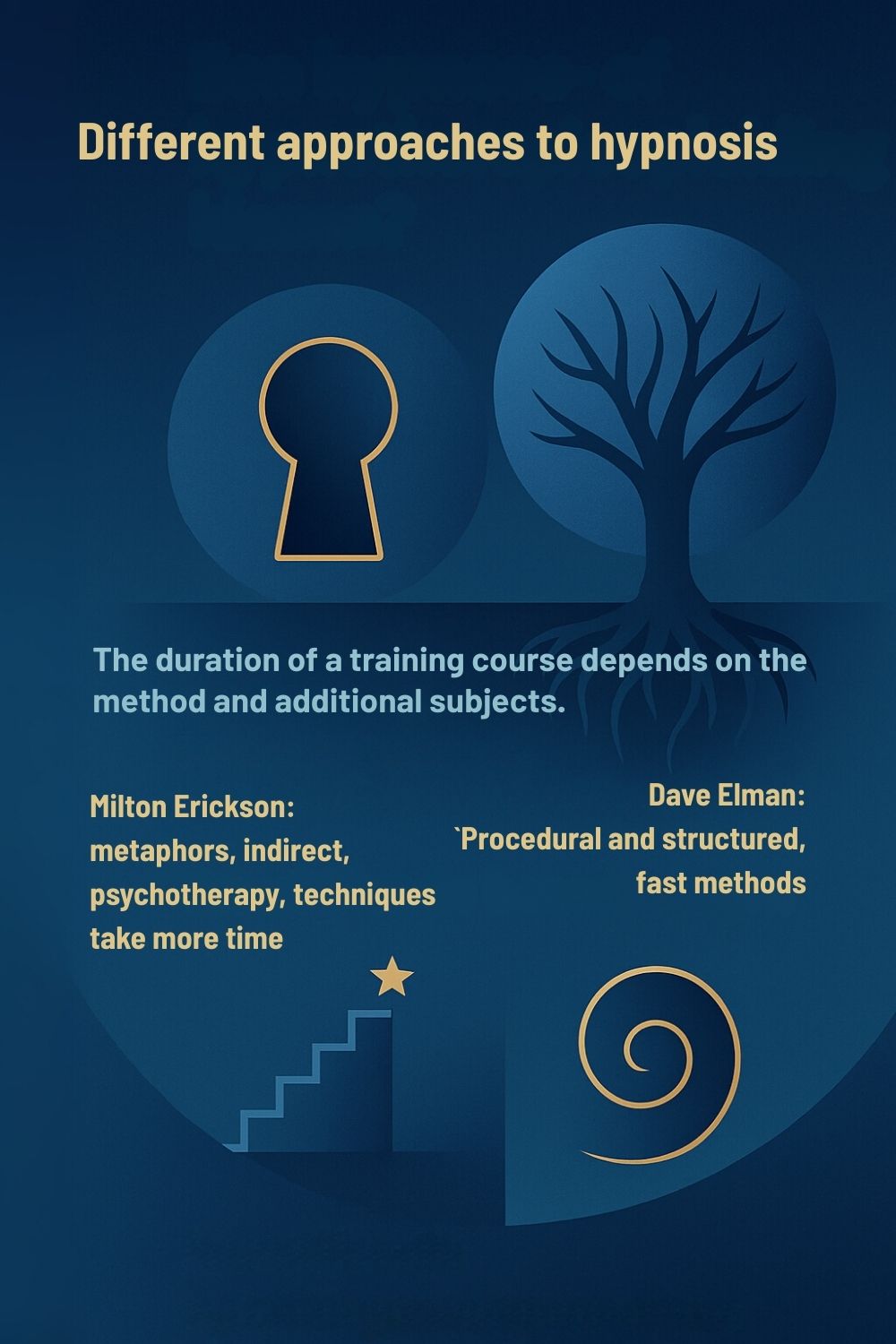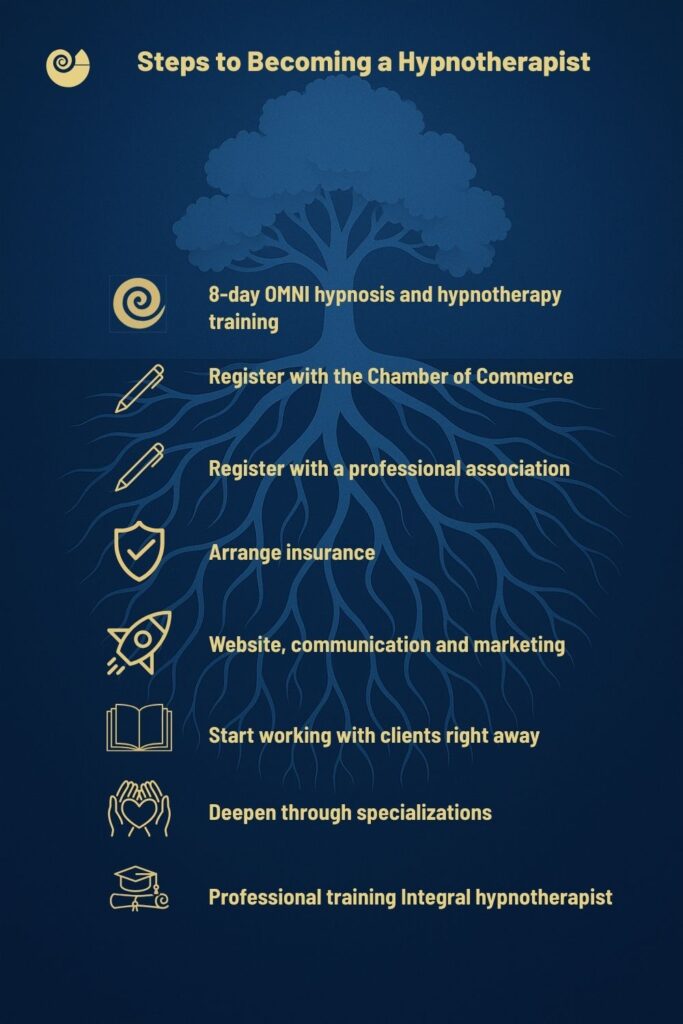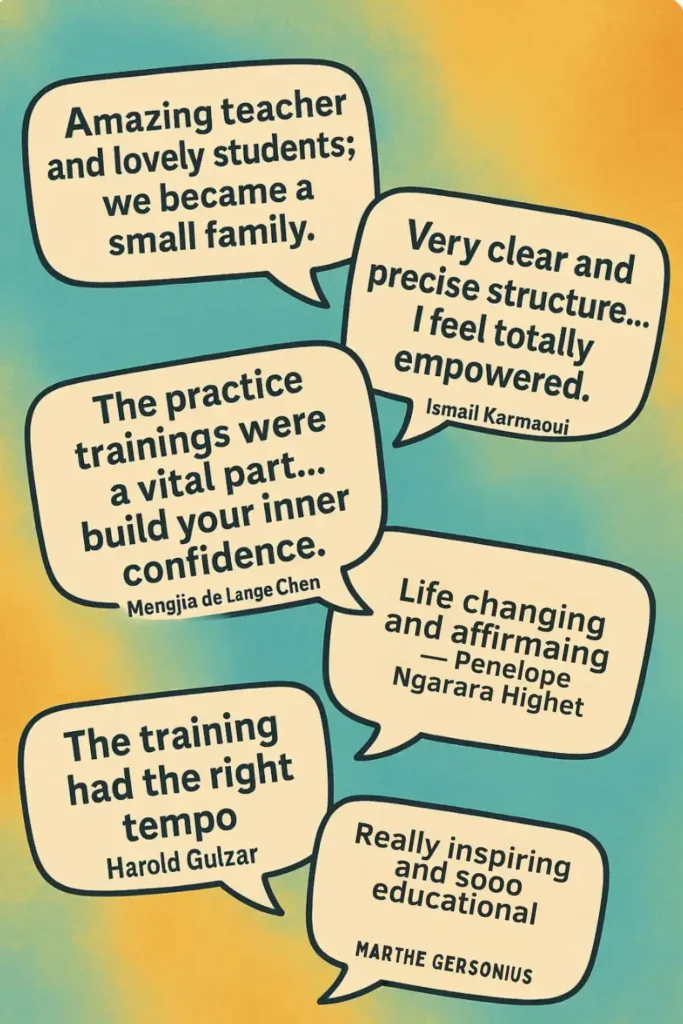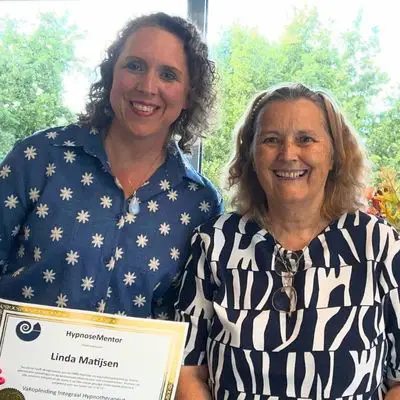Become a Hypnotherapist
Become a professional hypnotherapist with recognized, hands-on training and a solid, science-based approach.
- ✓ International diploma
- ✓ Hands-on learning with lots of practice
- ✓ Directly applicable techniques
Become a professional hypnotherapist with recognized, hands-on training and a solid, science-based approach.
Become a Hypnotherapist means choosing a profession in which you guide people through profound change and recovery. Whether you are a coach, healthcare professional or beginner, an accredited training program is essential. At HypnoseMentor you will learn evidence-based work with hypnosis, supported by international certification, experienced teachers and intensive practical training.
This course consists of 8 classroom teaching days, combined with extensive self-study and online modules. You start with basic hypnosis, learn techniques such as suggestion and self-hypnosis, and then move on to regression and in-depth therapeutic methods. From day one you practice actively – live, with fellow students and personal feedback. Upon completion, you will receive an internationally recognized diploma.
“What education is right for me? I can’t see the forest for the trees…” – recognizable. Some trainings last only 8 days, others 2 to 3 years. How is that possible?
Duration of a course
The duration of a course depends mainly on two factors: the method and the additional subjects included.
Our trainings are based on the ideas of Dave Elman
Additional training components
Long-term pathways often include additional modules, such as basic medical or psychological knowledge (e.g., according to the Plato model). Because these courses combine hypnotherapy with psychotherapy, the study naturally takes longer.

After the OMNI hypnosis and hypnotherapy training you can follow various specializations with us. This will allow you to build further on your knowledge and practical experience, which can culminate in the professional training to become an integral hypnotherapist. Depending on your c.v., previous studies and your psychological and/or medical basic knowledge, you can work out a path towards reimbursement for your therapy together with a professional association.

A frequently asked question is whether hypnotherapy is reimbursable through health insurance. More and more people are choosing complementary care, but reimbursements are limited. Clients need supplementary insurance, which also does not always match every professional association. It is also a stretch for therapists: the requirements are high and costly. Therefore, we see more and more therapists working without being reimbursed.
Please note that the decision about reimbursement always lies with the health insurance company and the professional association with which you are affiliated. HypnoseMentor cannot make any promises about this.
We offer training and pathways that can contribute to the conditions for reimbursability, but the final recognition and reimbursement are through external bodies.
Participants especially appreciate the intensive practice, the immediate applicability and the confidence they build to work with hypnosis professionally.


In the fall of 2020, Linda Matijsen decided to start hypnosis training at HypnoseMentor. Her motivation came from a personal experience as a client with a hypnotherapist in Breda. What she experienced there touched her deeply:
“I thought it was so miraculous at that hypnotherapy – if this can be done in such a way and so fast already results, I should know all about that!”
That experience became the start of a learning and development path that eventually led her to become a licensed Integral Hypnotherapist.
First steps and growth: Linda enthusiastically began basic and advanced training. Soon she noticed that practice plays a big role in the learning process:
“Your first clients are the ones you need. You get to practice on those, and those are often not the very tough questions yet. But the further you develop, the deeper the questions are.”
She stepped right in, without endless practice on the sidelines:
“Immediately got into it, yes. It has to do with a piece of confidence. That’s where you learn best. Then you get feedback from the session itself and from people too, of course.”
Structure and freedom: In the beginning, the fixed structure of the training provided a foothold. But as her experience grew, Linda found that she could work more and more freely:
“In the beginning, you also need that structure. But later you can actually let it go. And then with everything you’ve learned, start weaving it in, then it becomes even more fun.”
The professional training: The step to the professional training Integral Hypnotherapist brought depth. Linda especially names the mission-vision-strategy assignment and the intervision as valuable components:
“I definitely found those instructive, especially mission-vision strategy makes you take a hard look at your business.”
“It’s valuable to have a peer review group to discuss cases.”
Full-fledged practice: What began as a small practice grew into a full-fledged business. Linda now works full-time as a hypnotherapist, five days a week and two evenings. The growth process was organic: as her own development progressed, more and more clients with more complex questions came to her.
Completion and meaning: Looking back, Linda values the completion of training:
“I would just go for it anyway to learn it completely. For me, it has a lot of value. For me, something is off, so I’m top.”
The Professional Training Program Integral Hypnotherapist is a year-long training at college level in which you combine theory, practice, specializations and personal development. You will work with OMNI methodologies and learn to work professionally with different client questions and interventions.
You do not enroll in the entire professional training at once. You can build this pathway step by step: start with the OMNI Hypnosis and Hypnotherapy training, then follow various specializations and finally complete with the core competency courses and related assignments. This way you save credits and work towards the diploma of Integral Hypnotherapist at your own pace.
Professionals who wish to work with hypnotherapy as coaches, therapists or healthcare professionals.
Participants with at least MBO-4 or college work/thought levels (entry without previous hypnosis training is possible; you will then start with basic and advanced).
Those who want to specialize and shape practice in their own area of interest.
Scientific foundation: working with evidence-informed OMNI techniques.
Modular specializations: including medical hypnosis, pain management, pediatric hypnosis.
Strong guidance & practice: small groups, personal feedback, peer review and practice moments.
Approximately 200 hours of classroom instruction, plus ~230 hours of self-study.
Includes ~20 hours of practical sessions and ~20 hours of peer review.
Minimum duration: 1 year (depending on specializations and scheduling).
Total: 17 EC (European Credits).
An all-round professional degree that will make you professionally employable in coaching, wellness and care, or in your own practice.
Deepening in ethics, vision, professional attitude and specialty techniques.
Flow-through opportunities within specializations and connection to relevant professional contexts.
Why are more and more people choosing this profession? Here are the main benefits of training as a hypnotherapist:
You will receive an international diploma with the OMNI hypnosis and hypnotherapy training. But what exactly does that mean?
An international diploma means that the course is recognized by international organizations and professional associations, which means that a diploma can often (but not always automatically) be recognized in other countries.
Important: exactly what “being recognized” means depends very much on the country where you want to work. In the Netherlands, for example, this is often done through professional associations such as the Catcollective.
Other countries have different rules or additional requirements. So a diploma can be valuable, but it is always necessary to check for yourself how this works in your situation and country.
Voor de OMNI Hypnose- en Hypnotherapieopleiding heb je minimaal mbo-4 of hbo werk- en denkniveau nodig. Je hoeft geen medische of psychologische achtergrond te hebben. De opleiding begint bij de basis en bouwt stap voor stap op, zodat iedereen die gemotiveerd is hypnotherapeut kan worden.
De basis- en gevorderde opleiding bestaat uit 8 klassikale lesdagen, gecombineerd met online modules en zelfstudie. Na afronding kun je al met cliënten werken. Wil je verder groeien, dan kun je specialisaties volgen en uiteindelijk doorstromen naar de Vakopleiding Integraal Hypnotherapeut.
Na het afronden ontvang je een internationaal erkend OMNI-diploma. Dit diploma laat zien dat je professioneel bent opgeleid en geeft toegang tot beroepsverenigingen en het OMNI Hypnotherapist Register.
Korte opleidingen, zoals de 8-daagse hypnotherapieopleiding, zijn niet direct vergoedbaar. Voor vergoeding vragen verzekeraars meestal een traject van 2–3 jaar, inclusief psychologische of medische basiskennis. Via het Catcollectief kun je een persoonlijk pad naar vergoedbaarheid uitstippelen, afhankelijk van je c.v. en eerdere opleidingen.
Ja. Je kunt stap voor stap verder studeren: start met de OMNI basis- en gevorderde opleiding, kies daarna uit verschillende specialisaties en rond af met kerncompetenties en opdrachten. Zo spaar je studiepunten en bouw je in je eigen tempo toe naar het diploma Integraal Hypnotherapeut.
Ja. Veel studenten combineren de opleiding met hun baan of eigen praktijk. De lesdagen zijn planbaar en een groot deel van de studiebelasting bestaat uit oefening en zelfstudie die je flexibel kunt indelen. Zo kun je hypnotherapeut worden naast je huidige werk
Een hypnoseopleiding richt zich vooral op de technieken om iemand snel en veilig in hypnose te brengen. Een hypnotherapieopleiding gaat verder: je leert ook therapeutische interventies en hoe je cliënten helpt bij diepgaande thema’s en blijvende verandering. Bij OMNI worden beide onderdelen gecombineerd, zodat je meteen breed inzetbaar bent.
Ja. We bieden gratis proeflessen aan zodat je zelf kunt ervaren hoe de opleiding werkt, wat de sfeer is en hoe onze docenten lesgeven. Dit helpt je een bewuste keuze te maken als je hypnotherapeut wilt worden.
<